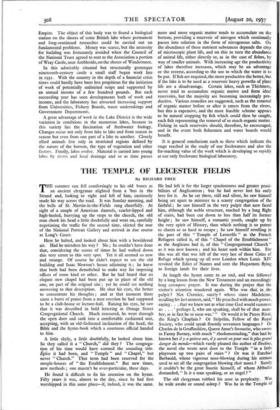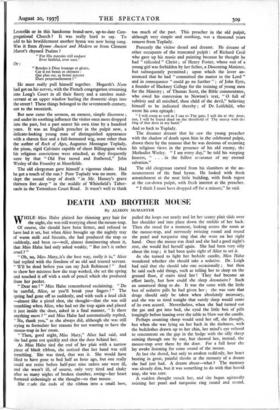THE TEMPLE OF LEICESTER FIELDS
By RICHARD FREE
THE summer sun fell comfortingly to his old bones as an ancient clergyman alighted from a 'bus in the Strand and, looking to right and left of him, cautiously made his way across the road. It was Sunday morning, and the bells of St. Martin-in-the-Fields rang cheerfully. At sight of a couple of American damsels, scarlet-lipped and high-heeled, hurrying up the steps to the church, the old man shook his head a little doubtfully and went on, carefully negotiating the traffic for the second time, skirted the rear of the National Portrait Gallery and arrived in due course at Long's Court.
Here he halted, and looked about him with a bewildered air. Had he mistaken his way ? No ; he couldn't have done that, considering the scores of times he had walked down this very street to this very spot. Yet it all seemed so new and strange. Of course he didn't expect to see the old building and Isaac Newton's house adjoining it ; he knew that both had been demolished to make way for imposing offices of some kind or other. But he had heard that an elegant new chapel had been put up in place of the old one, on part of the original site ; yet he could see nothing answering to that description. He shut his eyes, the better to concentrate his thoughts ; and at that moment there came a burst of praise from a neat erection he had supposed to be a club-house or lecture-hall. Raising his eyes, he saw that it was described in bold lettering as Orange Street Congregational Church. Much reassured, he went through the open door and sank into a comfortable cushioned seat, accepting, with an old-fashioned inclination of the head, the Bible and the hymn-book which a courteous official handed to him.
A little shyly, a little doubtfully, he looked about him. So they called it a " Church," did they ? The congrega- tion of his time would have scorned the sounding title. Eglise it had been, and " Temple " and " Chapel," but never " Church." That term had been reserved for the steeple-houses of " the Establishment." But new times, new methods ; one mustn't be over-particular, these days.
He found it difficult to fix his attention on the hymn. Fifty years it was, almost to the day, since he had first worshipped in this same place—if, indeed, it was the same. He had left it for the larger spaciousness and greater possi- bilities of Anglicanism ; but he had never lost his early love for it. As he sat there, still and silent, he saw himself being set apart to minister to a scanty congregation of the faithful ; he saw himself in the very pulpit that now faced him, although the noble structure, reached by a long flight of stairs, had been cut down to less than half its former height ; he saw himself, a romantic youth, caught up by the very spirit of History, than which nothing is so potent to charm or so hard to escape ; he saw himself revelling in the past of this " Temple of Lesterfils " as the French Refugees called it, of this " Chapel of the Establishment " as the Anglicans had it, of this " Congregational Church " as it was now known ; and his heart sank within him. For this was all that was left of the very last of those Cities of Refuge which sprang up all over London when Louis XIV revoked the Edict of Nantes and sent the Huguenots flying to foreign lands for their lives.
At length the hymn came to an end, and was followed by a long lesson from the New Testament and an exceedingly long extempore prayer. It was during the prayer that the visitor's attention wandered again. Who was •that in the pulpit ? Not Chamier, surely ? whose sister Madeleine, recalling his last sermon, said, " He preached with much power, saying . . . that we knew not at what time God would summon us . . . ' perhaps I, who am speaking, shall be of that num- ber, as in fact he so soon was.' " Or would it be Pierre Rival, the King's Chaplain ? Or Step elin, Fellow of the Royal Society, who could speak fluently seventeen languages ? Or Charles de la Gruffardiere, Queen Anne's favourite, who swore to Fanny Burney, with much " rhodomontading," that had he known her it y a quinze ans, it y auroit en pour moi le plus grand danger du monde—which vastly pleased the author of Evelina, the novel she wrote next door to the Temple " in a little playroom up two pairs of stairs " ? Or was it Ezechiel Barbauld, whose vigorous nose-blowing during his sermon used to set all the congregation blowing their noses ? Surely it couldn't be the great Saurin himself, of whom Abbadie demanded, " Is it a man speaking, or an angel ? "
The old clergyman rubbed his nose in perplexity. Was he wide awake or sound asleep ? Was he in the Temple of Lesterfils or in this handsome brand-new, up-to-date Con- gregational Church ? It was really hard to say. To add to his bewilderment another hymn was now being sung. Was it from Hymns Ancient and Modern or from Clement Marot's rhymed Psalms ?
" For His mercies still endure Ever faithful, ever sure."
Or:
" Rendez a Dieu louange et gloire, Car il est benin et clement : Qui plus est, sa bonte notoire Dure perpetuellement ?"
He must really pull himself together. Hogarth's Noon had got on his nerves, with the French congregation streaming into Long's Court in all their finery and a careless maid- servant at an upper window hurling the domestic slops into the street ! These things belonged to the seventeenth century, not to the twentieth.
But now came the sermon, an earnest, simple discourse ; and under its soothing influence the visitor once more dropped into the past, but a past nearer his own time by a hundred years. It was an English preacher in the pulpit now, a delicate-looking young man of distinguished appearance with a shaven face and a full-bottomed wig, none other than the author of Rock of Ages, Augustus Montague Toplady, the pious, rigid Calvinist capable of sheer Billingsgate when his religious convictions were attacked, as they frequently were by that " Old Fox tarred and feathered," John Wesley of the Foundry at Moorfields.
The old clergyman gave himself a vigorous shake. Had he got a touch of the sun ? Poor Toplady was no more. He slept the sound sleep of death " in Mr. Hussey's grave thirteen feet deep " in the middle of Whitefield's Taber- nacle in the Tottenham Court Road. It wasn't well to think too much of the past. This preacher in the old pulpit, although very simple and soothing, was a thousand years remove from Toplady.
Presently the visitor dozed and dreamt. He dreamt of other occupants of the truncated pulpit : of Richard Cecil who gave up his music and painting because he thought he had " ridiculed " Christ ; of Henry Foster, whose suit of a young girl was forbidden by her father, a Dissenting Minister, but subsequently permitted ; upon which the lover an- nounced that he had " committed the matter to the Lord " and in consequence " could go no further " ; of John Eyre, a founder of Hackney College for the training of young men for the Ministry ; of Thomas Scott, the Bible commentator, who owed his conversion to Newton's text, " 0 full of subtlety and all mischief, thou child of the devil," believing himself to be indicated thereby ; of Dr. Leifchild, who wrote his own epitaph : " I will creep as well as I can to Thy gate, I will die at thy door, yea, I will be found dead on the threshold of Thy mercy with ti° ring of that door in my hand."
And so back to Toplady.
The dreamer dreamt that he saw the young preacher with the shadow of death upon him in the celebrated pulpit, drawn there by the rumour that he was desirous of recanting his religious views in the presence of his old enemy, the Methodist Wesley. " I am every day," he told his weeping hearers, " . . . in the fullest assurance of my eternal salvation."
The old clergyman started from his slumbers at the an- nouncement of the final hymn. He looked with fresh astonishment at the neat little building, with fresh regret at the cut-down pulpit, with fresh interest at the preacher.
" I think I must have dropped off for a minute," he said.







































 Previous page
Previous page